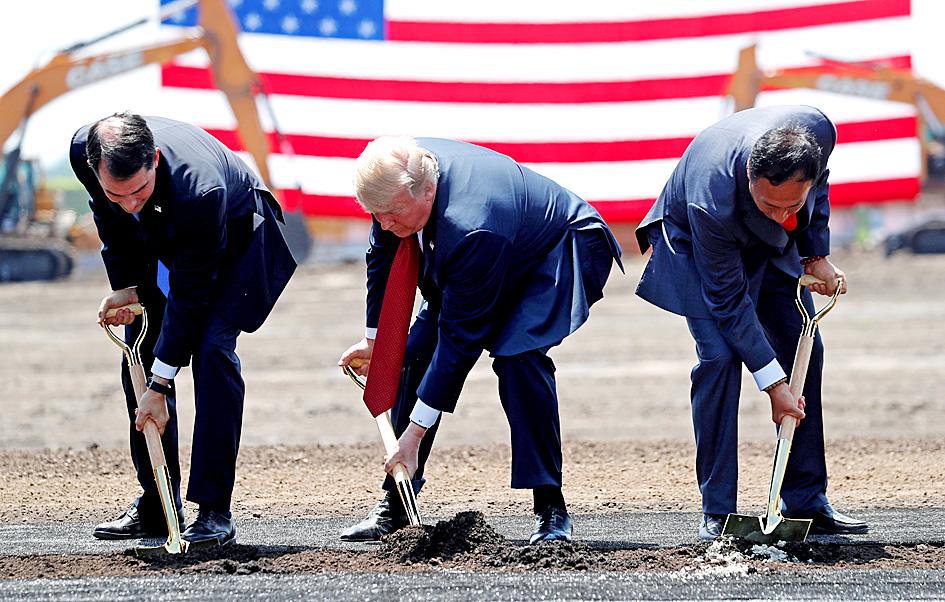Worldwide electronics leader Foxconn Technology Group (富士康科技集團) breached terms of its contract in Wisconsin, while local governments spent hundreds of millions of US dollars to prepare for the project, a lawsuit filed by a real-estate development company alleges.
Hintz Real Estate Development Co claims that Foxconn, known as Hon Hai Precision Industry Co (鴻海精密) in Taiwan, is in breach of its contract by failing to construct a 10.5G LCD manufacturing facility in southeast Wisconsin not far from the Illinois border, the Milwaukee Journal Sentinel reported on Wednesday.
Foxconn did not employ local workers in manufacturing and construction “to the extent agreed,” and failed to make capital investments in the county and village “to the extent agreed,” the lawsuit filed on Tuesday in Racine County Circuit Court said.

Photo: Reuters
The county and the Village of Mount Pleasant have spent US$200 million on land acquisition, US$185 million on the development of water and sewer lines, and US$12 million on roads to prepare for the project, the lawsuit said.
The lawsuit was brought by Caledonia resident Daniel Hintz and Hintz Real Estate Development. It was filed on behalf of Racine County and the Village of Mount Pleasant, but it also names the county and the village as the defendants along with Foxconn.
Foxconn said in a statement that it does not comment on lawsuits.
“Foxconn continues to fulfill its financial obligations under the local development agreement and is proud to be the largest taxpayer in the Village of Mount Pleasant and Racine County,” the company said.
Wisconsin landed plans for Foxconn’s first US factory after then-governor Scott Walker offered more than US$3 billion in tax incentives, but the company’s plans were later scaled back.
The original plan was for Foxconn to build a 10. 5G LCD facility, capable of building large screens, but the project was scaled back to a 6G facility.
That size factory makes smaller screens for smartphones, tablets and televisions.
In the original agreement, the state agreed to provide up to US$2.85 billion of tax incentives if Foxconn met certain hiring and capital investment thresholds.
The state has yet to award the company tax credits for those purposes, but local governments have spent millions of taxpayer dollars on infrastructure upgrades.
Foxconn and the Wisconsin Economic Development Corp have been negotiating a new contract for which Foxconn is willing to agree to fewer tax credits “in exchange for flexibility.”

Three experts in the high technology industry have said that US President Donald Trump’s pledge to impose higher tariffs on Taiwanese semiconductors is part of an effort to force Taiwan Semiconductor Manufacturing Co (TSMC, 台積電) to the negotiating table. In a speech to Republicans on Jan. 27, Trump said he intends to impose tariffs on Taiwan to bring chip production to the US. “The incentive is going to be they’re not going to want to pay a 25, 50 or even a 100 percent tax,” he said. Darson Chiu (邱達生), an economics professor at Taichung-based Tunghai University and director-general of

‘LEGACY CHIPS’: Chinese companies have dramatically increased mature chip production capacity, but the West’s drive for secure supply chains offers a lifeline for Taiwan When Powerchip Technology Corp (力晶科技) entered a deal with the eastern Chinese city of Hefei in 2015 to set up a new chip foundry, it hoped the move would help provide better access to the promising Chinese market. However, nine years later, that Chinese foundry, Nexchip Semiconductor Corp (合晶集成), has become one of its biggest rivals in the legacy chip space, leveraging steep discounts after Beijing’s localization call forced Powerchip to give up the once-lucrative business making integrated circuits for Chinese flat panels. Nexchip is among Chinese foundries quickly winning market share in the crucial US$56.3 billion industry of so-called legacy

Taiwan Semiconductor Manufacturing Co (TSMC, 台積電) yesterday held its first board of directors meeting in the US, at which it did not unveil any new US investments despite mounting tariff threats from US President Donald Trump. Trump has threatened to impose 100 percent tariffs on Taiwan-made chips, prompting market speculation that TSMC might consider boosting its chip capacity in the US or ramping up production of advanced chips such as those using a 2-nanometer technology process at its Arizona fabs ahead of schedule. Speculation also swirled that the chipmaker might consider building its own advanced packaging capacity in the US as part

A move by US President Donald Trump to slap a 25 percent tariff on all steel imports is expected to place Taiwan-made steel, which already has a 25 percent tariff, on an equal footing, the Taiwan Steel & Iron Industries Association said yesterday. Speaking with CNA, association chairman Hwang Chien-chih (黃建智) said such an equal footing is expected to boost Taiwan’s competitive edge against other countries in the US market, describing the tariffs as "positive" for Taiwanese steel exporters. On Monday, Trump signed two executive orders imposing the new metal tariffs on imported steel and aluminum with no exceptions and exemptions, effective